新概念英语57课讲义
新概念英语57课讲义
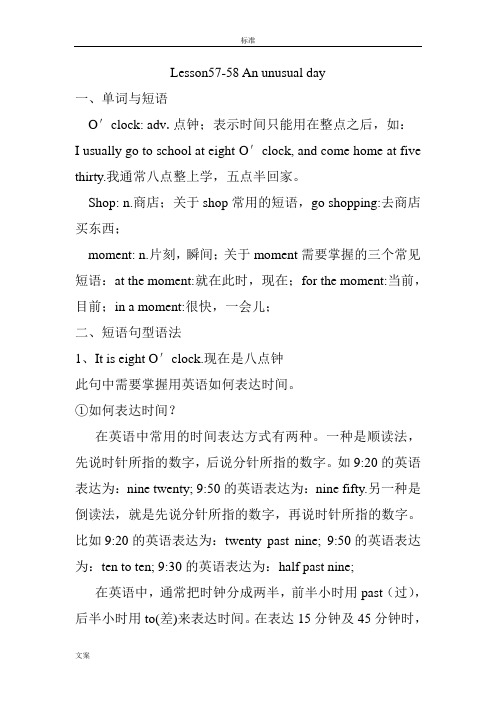
Lesson57-58 An unusual day一、单词与短语O′clock: adv.点钟;表示时间只能用在整点之后,如:I usually go to school at eight O′clock, and come home at five thirty.我通常八点整上学,五点半回家。
Shop: n.商店;关于shop常用的短语,go shopping:去商店买东西;moment: n.片刻,瞬间;关于moment需要掌握的三个常见短语:at the moment:就在此时,现在;for the moment:当前,目前;in a moment:很快,一会儿;二、短语句型语法1、It is eight O′clock.现在是八点钟此句中需要掌握用英语如何表达时间。
①如何表达时间?在英语中常用的时间表达方式有两种。
一种是顺读法,先说时针所指的数字,后说分针所指的数字。
如9:20的英语表达为:nine twenty; 9:50的英语表达为:nine fifty.另一种是倒读法,就是先说分针所指的数字,再说时针所指的数字。
比如9:20的英语表达为:twenty past nine; 9:50的英语表达为:ten to ten; 9:30的英语表达为:half past nine;在英语中,通常把时钟分成两半,前半小时用past(过),后半小时用to(差)来表达时间。
在表达15分钟及45分钟时,可以用quarter(一刻),同理,前半小时用past, 后半小时用to.比如9:15:的英语表达式为:a quarter past nine; 9:45的英语表达式为a quarter to ten.②如何询问时间询问时间常见的几种表达方式:What time is it? What is the time?What time is it by your watch?Excuse me, have you got the time?2、they are going to school on foot.他们正步行上学On foot:步行,是方式状语,另外表达用什么方式、凭什么工具经常用by加具体的名词,如:by sea:乘船by ship:乘船by bus:乘公共汽车by bike:骑自行车by air:乘飞机by plain:乘飞机3、课文中重点短语集锦:go to school:去上学on foot:步行stay at home: 呆在家里drink tea:喝茶in the living room:在卧室里in the garden:在花园里do homework:做家庭作业at the moment:此时此刻read newspaper: 读报纸4、重点语法:现在进行时(一)现在进行时是指正在发生的动作或事件,动作发生的时间是“现在”,动作目前的状态是“正在进行中”。
新概念英语Lesson 57-58讲义

新概念一讲义Lesson 57-58 An unusual day Text1. What's the time?/ What time is it?It's … o'clock. (表示整点)如果不是整点数字,后不加o’clock.2.具体时刻作时间状语时,前面要加介词atI come home at about five thirty every afternoon.短语:by car 乘汽车by train 乘火车by bus 乘公共汽车by ship/boat/ sea 乘船by taxi 乘计程车by plane/ air 乘飞机at the moment 此刻现在习题一、用动词的适当形式填空。
1.______ she ________(teach) history or Chinese?2.______ it _________(snow) here in winter?3.______(not come) in! We ______(have) classes now.4.______ she _______(have) an exam every week?5.My father _______(water) the flowers in the garden every day.二、把下列各句变为一般疑问句,并做肯定否定回答。
1.Your brother wants some coffee.____________________________________ ____________________________________ 2.She always cooks the meal at 6 o’clock. ____________________________________ ____________________________________ 3.He comes back from work at five.____________________________________ ____________________________________ 4.They go to town on foot every day.____________________________________ ____________________________________三、用动词的适当形式填空。
最新新概念第一册第57课精品课件
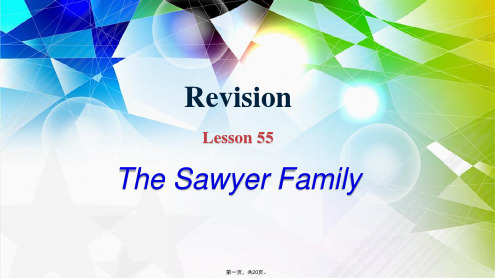
定义
句肯
子 结
否
构疑
动词 变化
一般现在时
习惯性或经常性发生的动作(dòngzuò)或 状态
主语+be+其他(状态(zhuàngtài)) 主语+V原/ V.单三 +其他(动作) 主语+be + not+其他
主语+don’t / doesn’t+V原+其他
Be+主语+其他? Do/ Does+主语+V原+其他?
4. Stellac_o_m__e_s (come)from England. 5. D__o__ they often _m_a_k_e_(make) cakes?
6. Her friend _d_o_e_s_n_’_t _w_o_r_k(not work) in Beijing.
7. It’s eight o’clock. The students _________
• 三点二十五 • twenty five past three
• 十二点差一刻 • a quarter to twelve
• 五点过两分 •past nine
• 五点零五分 • five past five
• 中午十二点 • twelve o’clock at noon
(haavree)haanviEnngglish class.
第十七页,共20页。
Let’s learn more!
• 时间的表达
• ① 整点: It’s … o’clock.
• ② 几点几分: • ★ 用fi分ve 钟+ ppaasstt+点thr钟ee 表示 “几点过几分”(半小时内)
新概念第二册57课can i help you讲解

2. How was the woman dressed when she returned to the same shop the following morning?
She returned to the shop the following
Have you recited 夫人
madam
ns
犹豫,迟疑 hesitate
接待
serve
轻蔑地 scornfully
惩罚 裘皮
punish fur
热切的,热情的 eager
Have you ever had some interesting or unforgettable experience when you went shopping? Tell us .
Can you see that woman in the blue coat? 今天他穿着黑色夹克。
He is in a black jacket today. 2. with表示穿戴,只能作定语,一般和 眼镜、手套等连用。
The boy with thick glasses is our monitor. 戴深度眼镜那个男孩是我们的班长。
punish v. 惩罚
punish sb. 惩罚某人
The boy was punished for being late. 这男孩因迟到受到处分。
fur
n. 裘皮 一件裘皮大衣 a fur coat =a coat of fur
eager /'i:ɡə / adj. 热切的,渴望的
1) be eager for sth We are eager for success.
新概念英语第三册 Lesson57 课文音标版讲义
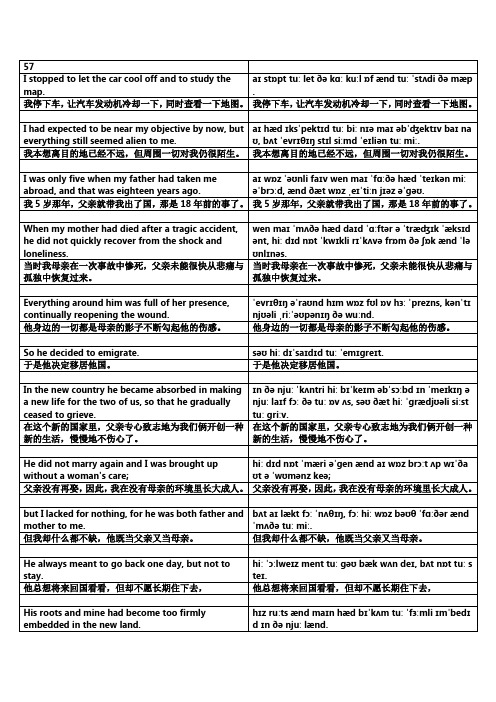
57I stopped to let the car cool off and to study the map. aɪ stɒpt tuː let ðə kɑːkuːlɒf ænd tuːˈstʌdiðə mæp .我停下车,让汽车发动机冷却一下,同时查看一下地图。
我停下车,让汽车发动机冷却一下,同时查看一下地图。
I had expected to be near my objective by now, but everything still seemed alien to me. aɪ hæd ɪksˈpektɪd tuːbiː nɪə maɪəbˈʤektɪv baɪ na ʊ, bʌt ˈevrɪθɪŋ stɪl siːmdˈeɪliən tuːmiː.我本想离目的地已经不远,但周围一切对我仍很陌生。
我本想离目的地已经不远,但周围一切对我仍很陌生。
I was only five when my father had taken me abroad, and that was eighteen years ago. aɪ wɒz ˈəʊnli faɪv wen maɪˈfɑːðə hæd ˈteɪkən miːəˈbrɔːd, ænd ðæt wɒzˌeɪˈtiːn jɪəzəˈɡəʊ.我5岁那年,父亲就带我出了国,那是18年前的事了。
我5岁那年,父亲就带我出了国,那是18年前的事了。
When my mother had died after a tragic accident, he did not quickly recover from the shock and loneliness. wen maɪˈmʌðə hæd daɪd ˈɑːftərəˈtræʤɪkˈæksɪd ənt,hiːdɪd nɒtˈkwɪkli rɪˈkʌvəfrɒmðəʃɒk ænd ˈləʊnlɪnəs.当时我母亲在一次事故中惨死,父亲未能很快从悲痛与孤独中恢复过来。
新概念英语第二册:第57课课文详解及语法解析
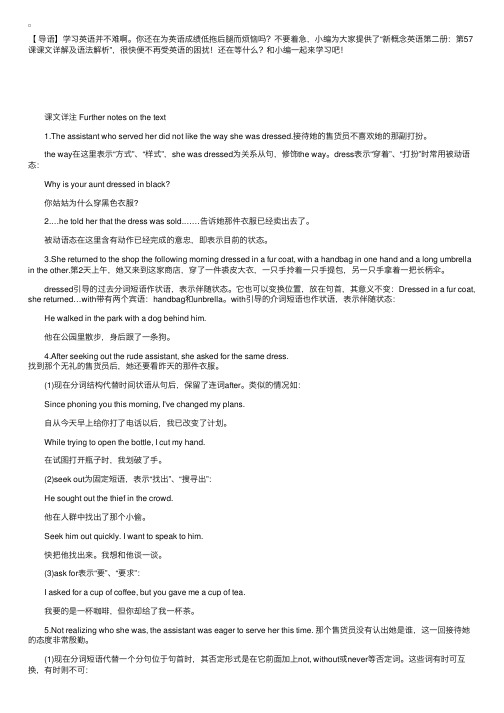
【导语】学习英语并不难啊。
你还在为英语成绩低拖后腿⽽烦恼吗?不要着急,⼩编为⼤家提供了“新概念英语第⼆册:第57课课⽂详解及语法解析”,很快便不再受英语的困扰!还在等什么?和⼩编⼀起来学习吧! 课⽂详注 Further notes on the text 1.The assistant who served her did not like the way she was dressed.接待她的售货员不喜欢她的那副打扮。
the way在这⾥表⽰“⽅式”、“样式”,she was dressed为关系从句,修饰the way。
dress表⽰“穿着”、“打扮”时常⽤被动语态: Why is your aunt dressed in black? 你姑姑为什么穿⿊⾊⾐服? 2.…he told her that the dress was sold.……告诉她那件⾐服已经卖出去了。
被动语态在这⾥含有动作已经完成的意忠,即表⽰⽬前的状态。
3.She returned to the shop the following morning dressed in a fur coat, with a handbag in one hand and a long umbrella in the other.第2天上午,她⼜来到这家商店,穿了⼀件裘⽪⼤⾐,⼀只⼿拎着⼀只⼿提包,另⼀只⼿拿着⼀把长柄伞。
dressed引导的过去分词短语作状语,表⽰伴随状态。
它也可以变换位置,放在句⾸,其意义不变:Dressed in a fur coat, she returned…with带有两个宾语:handbag和unbrella。
with引导的介词短语也作状语,表⽰伴随状态: He walked in the park with a dog behind him. 他在公园⾥散步,⾝后跟了⼀条狗。
4.After seeking out the rude assistant, she asked for the same dress.找到那个⽆礼的售货员后,她还要看昨天的那件⾐服。
新概念第二册Lesson 57 (共36张PPT)

★scornfully adv. 轻蔑地
• The guard looked at the old man in rags scornfully. • 门卫轻蔑地打量这个衣衫烂缕的老人。 • look down upon/on 看不起,瞧不起…… • He looks down on me. • scornful adj. 鄙视的,轻蔑的 • A scornful smile • A scornful look
• • • • • • • • • •
• 关于moment的词组 at the moment 眼下,当前 for the moment 暂时,目前 at this/that moment 在此、那时 at this moment in time 此时此刻 in a moment 立刻、马上 for a moment 一会儿 wait/just a moment 稍等一小会儿 the last moment 最后一刻 big moment 大好时机 choose/pick your moment 选择好的时机
• • • • • • •
hesitation n. without hesitation 毫不犹豫 Without hesitation he refused my request. make up one's mind 下决心做…… determine (v.) She determined to go that very afternoon. 她决定就在那天下午走。
Mr. 先生(男子姓或姓名前,职务前) Mr. White 怀特先生 Mr. President 总统先生 Sir 对男子的礼貌称呼 Yes, sir. 中小学生对男老师的称呼 信的称呼 Dear Sir
新概念第二册第57课经典课件
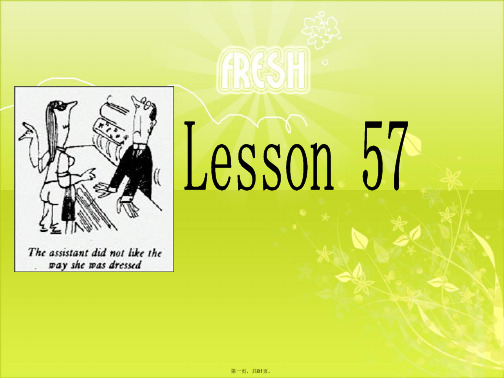
第四十二页,共81页。
2. put on “穿上、戴上”,强调“穿”“戴”的动 作,后接衣服(yī fu)、鞋帽等。
I want you to put on this coat and this hat. 我要你穿这件外套,戴这顶帽子。
第一页,共81页。
Madam jeans hesitate serve scornfully punish fur eager
New words
n. 太太,夫人 n. 牛仔裤 v. 犹豫,迟疑 v. 接待(顾客) adv. 轻蔑地 v. 惩罚 n. 裘皮(qiú pí) adj. 热切的,热情的
第二页,共81页。
2) v. 鄙视,傲慢的拒绝 scorn sb’s invitation 傲慢的拒绝某人的邀请
(yāoqǐng) scorn sb’s advice 鄙视某人的建议 scorn sb’s offer 拒绝某人的帮助
第二十四页,共81页。
punish
v. 惩罚 vi. punish sb. 惩罚某人
Service n. 服务 at one’s service 为某人效劳 service station 加油站 service industry 服务业
第十九页,共81页。
serve
v. 接待(jiēdài)(顾客)
Can I serve you in any way? 我能帮你忙吗?
第二十页,共81页。
顿 teach sb a lesson 教训某人(mǒu rén)一顿
punishment n. 惩罚 capital punishment 死刑
第二十六页,共81页。
- 1、下载文档前请自行甄别文档内容的完整性,平台不提供额外的编辑、内容补充、找答案等附加服务。
- 2、"仅部分预览"的文档,不可在线预览部分如存在完整性等问题,可反馈申请退款(可完整预览的文档不适用该条件!)。
- 3、如文档侵犯您的权益,请联系客服反馈,我们会尽快为您处理(人工客服工作时间:9:00-18:30)。
Lesson57-58 An unusual day一、单词与短语O′clock: adv.点钟;表示时间只能用在整点之后,如:I usually go to school at eight O′clock, and come home at five thirty.我通常八点整上学,五点半回家。
Shop: n.商店;关于shop常用的短语,go shopping:去商店买东西;moment: n.片刻,瞬间;关于moment需要掌握的三个常见短语:at the moment:就在此时,现在;for the moment:当前,目前;in a moment:很快,一会儿;二、短语句型语法1、It is eight O′clock.现在是八点钟此句中需要掌握用英语如何表达时间。
①如何表达时间?在英语中常用的时间表达方式有两种。
一种是顺读法,先说时针所指的数字,后说分针所指的数字。
如9:20的英语表达为:nine twenty; 9:50的英语表达为:nine fifty.另一种是倒读法,就是先说分针所指的数字,再说时针所指的数字。
比如9:20的英语表达为:twenty past nine; 9:50的英语表达为:ten to ten; 9:30的英语表达为:half past nine;在英语中,通常把时钟分成两半,前半小时用past(过),后半小时用to(差)来表达时间。
在表达15分钟及45分钟时,可以用quarter(一刻),同理,前半小时用past, 后半小时用to.比如9:15:的英语表达式为:a quarter past nine; 9:45的英语表达式为a quarter to ten.②如何询问时间询问时间常见的几种表达方式:What time is it? What is the time?What time is it by your watch?Excuse me, have you got the time?2、they are going to school on foot.他们正步行上学On foot:步行,是方式状语,另外表达用什么方式、凭什么工具经常用by加具体的名词,如:by sea:乘船by ship:乘船by bus:乘公共汽车by bike:骑自行车by air:乘飞机by plain:乘飞机3、课文中重点短语集锦:go to school:去上学on foot:步行stay at home: 呆在家里drink tea:喝茶in the living room:在卧室里in the garden:在花园里do homework:做家庭作业at the moment:此时此刻read newspaper: 读报纸4、重点语法:现在进行时(一)现在进行时是指正在发生的动作或事件,动作发生的时间是“现在”,动作目前的状态是“正在进行中”。
基本结构现在进行时的基本构成是:主语+be(am/is/are)+动词的现在分词形式(v+ing),具体表现如下:第一人称单数I+am+doing+Sth.I am reading a book:我正在看书第一人称复数We+are+doing +Sth.We are playing football now:我们正在踢足球第二人称单(复)数You+are+doing+Sth.You are looking at the blackboard: 你们正在看黑板第三人称单数He(She,it)+is+doing+Sth.She is playing basketball:她正在打篮球第三人称复数They+are+doing +Sth.They are watching TV:他们正在看电视动词现在分词的变化规则①一般情况下,直接在动词后加-ingwork ---- working; sleep ----- sleeping; study ----- studying ②动词以不发音的-e结尾,要去-e加-ingtake ----- taking make ----- making dance ----- dancing come – coming close – closing ride – ridingmove – moving have – having③重读闭音节,且末尾只有一个辅音字母的动词,要双写词尾字母,再加-ingcut ----- cutting put ----- putting begin ------ beginningsit--- sitting get---getting shop---shoppingswim--- swimming run ---running④以ie结尾的动词,把ie变成y再加-ing,常用的有以下三个:lie ----- lying tie ----- tying die ----- dying基本用法①现在进行时表示现在正在进行的动作或发生的事情:I am reading a book:我正在看书She is playing basketball:她正在打篮球They are watching TV:他们正在看电视②现在进行时表示“现阶段内”正在发生的事情,动作不一定正在进行:Tom, are you still working in that factory?汤姆,你还在那家工厂工作吗啊?She is teaching at a night school。
她在夜校教书Do not take the ladder away, your father is using it.别把梯子拿走,你父亲在用呢啊(不一定正在用)句型转换①在现在进行时的状态之下,把肯定句变成一般疑问句,只需要把be提前即可。
My father is reading a newspaper 变成一般疑问句:Is your father reading a newspaper?Yes, he is .No, he is′t②在现在进行时的状态之下,把肯定句变成否定句,只需在be动词之后加not即可,如:I am working→I am not working.He is running→He isn't runningThey are playing football→They aren't playing football.标志词:a t the moment; now;look!;listen!等课后练习(一)It was half-past eight in the morning. The telephone bell rang and Mary went to answer it."It's me-Peter.""Hello, who's that?" she asked.Peter was a friend of Mary's eight-year-old brother, John."Oh hello, Peter. What do you want?" said Mary."Can I speak to John?""No", said Mary," you can't speak to him now.He is busy. He is getting ready for school. He is eating his breakfast. Grandmother is combing his hair. Sister is under the table, putting his shoes on. Mother is getting his books and putting them in his school bag. Goodbye, I've got to go now. I have to hold the door open. The school bus is coming.1. Who went to answer it when the telephone bell rang?______A. John's sisterB. PeterC. JohnD. John's mother2. Whom did Peter want to speak to? _______A. Mary's brotherB. Mary's sisterC. Mary's grandmotherD. John's mother3. John couldn't speak to Peter because John _______.A. was combing his hairB. was putting his shoes onC. was getting his booksD. was busy eating his breakfast4. How do you say to a stranger who is answering your telephone?______A. Who are you?B. Anything to say?C. Who is it?D. Please5. From this story we know that John was_____.A. a lazy boyB. a clever boyC. a busy boyD. a hungry boy(二)A very new, young officer was at a station. He was on his way to visit his mother in another town, and he wanted to telephone her to tell her the time of this train , so that she could meet him at the station in her car.He look in all his pockets, but round that he did not have the right money for the telephone, so he went outside and looked around for someone to help him.At last an old soldier came by, and the young officer stopped him and said, “Have you got change(零钱)for ten pence(便士)?”“Wait a moment, ” the old soldier answered. He began to put his hand in his pock- et, “I'll see whether I can help you. ”“Don't you know how to speak to an officer?” the young man said angrily. “Now let's start again. Have you got change for ten pence? ” “No, sir,” the old soldier answered quickly. 1.The young officer and his mother lived______.A.in the same townB.in different placesC.in another cityD.in the other town2.The young officer Wanted to telephone his mother to tell her______.A.that he was going to visit herB.where his train would leave forC.what time his train would arrive at the stationD.that he was then at the station3.He looked around for help because he______.A.had no money to make the phone callB.did not know where to make the phone callC.needed some change for the phone callD.wanted to get change from the old soldier4.The young officer was angry because he thought the oldsoldier______.A.was polite to himB.was not polite to himC.didn't know how to speak to himD.didn't like to help him at all5.Which of the following is not true?A.Both the young officer and the old soldier were angry.B.The young officer wanted his mother to meet him at thestation.C.He wanted the old soldier to speak in a polite way.D.He didn't know the soldier before.。
